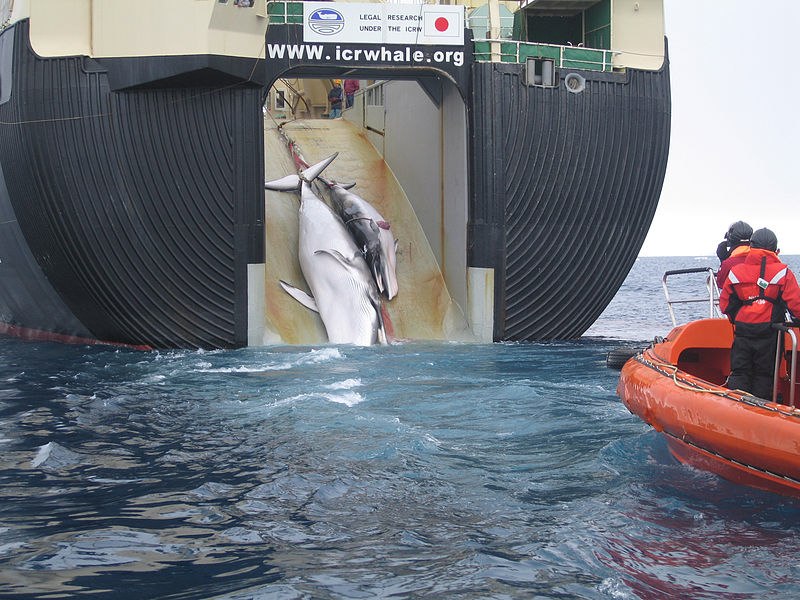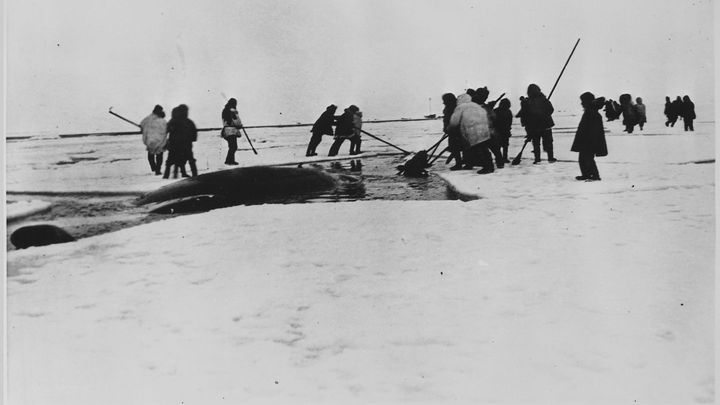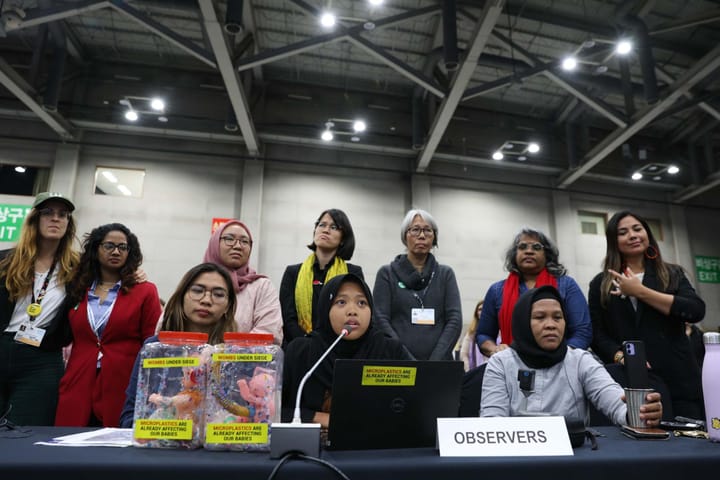Alaska’s indigenous communities every year undertake a whale hunt that has gone on for millennia. For remote villages in Alaska, the whale hunt is conducted purely for subsistence and has deep cultural roots. If Japan’s whaling lobby has its way, the rights of those native Alaskans could come under threat, used as a political bargaining chip.
“That hunt has gone out for at least a couple thousand years,” Phillip Clapham, a whale biologist at the National Oceanic at Atmospheric Administration’s Marine Mammal Laboratory in Seattle, tells Sludge. “It’s truly cultural. It’s truly for subsistence. It’s not one of these things where they claim it to be for subsistence but they’re actually doing it for commercial reasons.”
At the end of July, the D.C. lobbying firm Butterfield Evans and Associates was hired by Japan’s Institute for Cetacean Research. According to documents reviewed by Sludge that Butterfield filed with the Department of Justice and the Senate, the firm will lobby for the institute on “Alaskan whaling policy” and “US anti-whaling legislation.”
The Institute for Cetacean Research, funded largely by the Japanese government, is an offshoot of Japan’s Fisheries Agency, which conducts lethal research, killing whales in the name of scientific study. Its other key source of funding is selling the whale meat harvested during research operations. The practice has been widely criticized by the scientific community and whale conservationists, who have decried it as a cover for commercial whaling with no scientific benefit compared to existing non-lethal research methods.
“There’s really nothing you need to kill a whale for, in terms of what you need for population management,” says Clapham, who has authored numerous letters and articles on Japan’s lethal research program. “There are so many non-lethal techniques that are around that are as good or better in some cases. For instance, if you kill a whale, you get one data point but if you take a skin biopsy from a whale you can do that repeatedly over the life of a whale and get much more valuable data. Tens of thousands of whales have been biopsied worldwide and everyone else uses this technique.”
The Institute for Cetacean Research, which acts as the lobbying of the Fisheries Agency, could not be reached by Sludge for comment. When this reporter called Butterfield Evans and Associates asking questions about what specifically the firm was lobbying for, he was hung up on—twice.

To understand the Institute for Cetacean Research’s goals within the U.S., it’s necessary to understand a bit of the history of Japan’s attitudes towards whaling and its politicking at the International Whaling Commission.
Japan’s Loopholes and Puppet Votes
Japan, along with Iceland and Norway, is one of the only countries in the world still conducting commercial whaling today, and the Japanese government has a long history of opposing whaling conservation measures and being a thorn in the side of the International Whaling Commission.
In 1992, the Japanese government was the lone dissenting vote in establishing the Southern Ocean Whale Sanctuary around Antarctica. Through loopholes in the International Whaling Commission’s charter, Japan exempted itself from the restriction on whaling in the 19 million square mile zone. The Institute for Cetacean Research then began a program of annually hunting 50 humpback, 50 fin, and 900 minke whales in the name of scientific research.
The International Court of Justice eventually ruled Japan’s Antarctic whaling illegal in 2014. The Institute for Cetacean Research has since revised its hunt in the region to 333 minke whales per year.
In 2002, Japan hosted what was then an annual summit of the International Whaling Commission, which despite the scientific community’s broader consensus is itself to this day divided on the validity of Japan’s lethal research program.
“The 88 governments that make up the IWC are divided on whether the Japanese scientific whaling program of lethal research is necessary – and has been for a number of years,” Kate Wilson, a spokesperson for the commission told Sludge via email. “The IWC Scientific Committee has a role in scrutinizing and advising on these programs but this Committee is also divided on its conclusions regarding whether lethal research is necessary.”
Leading up to the 2002 meeting in Shimonoseki, a coastal whaling city in the prefecture where current Prime Minister Shinzo Abe began his political career, Japan began a long campaign of recruiting new members to secure puppet votes within the International Whaling Commission.
“The government of Japan undertook what amounted to a slow-motion, hostile takeover attempt at the IWC using fisheries aid and economic inducements,” Patrick Ramage, Whale Program Director at the International Fund for Animal Welfare, tells Sludge. “They usually targeted small island developing countries and other developing countries, including landlocked countries in Africa, to come to the IWC and support Japan’s position on various votes.”
In a 2005 documentary, the commissioner to the IWC from the Solomon Islands, for instance, confessed that “the Japanese pay the government’s subscriptions” and “support the delegations to the meetings, in terms of meeting airfares and per diem.” A 2010 Times of London investigation revealed several more Caribbean and African nations had taken money from Japan in exchange for supporting whaling. The payments were often made in literal cash-stuffed brown envelopes.
That campaign of lining up votes paid off in 2002, when Japan successfully orchestrated a block on setting the quota for the Alaskan indigenous whale hunt. Without the quota, the communities were not authorized by the commission to participate in their hunt, which the United States had pledged to abide by.
“A rather flamboyant Japanese commissioner, Masayuki Komatsu, played the homecourt advantage very well in Shimonoseki,” says Ramage, who was present at that meeting in 2002. “They held up and blocked progress on the aboriginal subsistence whaling proposal brought by the U.S. on behalf of the Alaska natives.
Ramage says that it was extraordinary even for Japan to block what had been a fairly routine matter of the IWC approving subsistence whaling quotas for Alaskan natives.
“It was obvious to anybody in the room that Japan was holding the aboriginal subsistence whaling quota hostage in an effort to achieve outcomes at the IWC more in line with the goals of the Japan Fisheries Agency and the Institute for Cetacean Research,” he said.
Indeed, the IWC minutes from that meeting state that “The reason given by some of the 11 countries who voted no was that they believed Japan should also be allocated subsistence whales for four coastal whaling villages.”
According to people familiar with the U.S. government’s thinking, this sent U.S. officials into a tailspin, as they did not want to go against the IWC, but were also committed to supporting the rights of the Alaskan native communities.
Why This Matters Now
The International Whaling Commission will meet next month in Brazil. The current bowhead whale quota for the Alaskan subsistence hunt, which is set in six-year blocks, expires this year, and a new quota will need to be set. At that same meeting, a proposal for the creation of a South Atlantic Whale Sanctuary will be voted on—a measure that has been introduced three previous times but has never met the three-quarters majority necessary to pass, due to the votes in Japan’s block.
Alaskan legislators are wary of the possibility that Japan could again block the indigenous whale hunt quota. For that reason, Senator Sullivan, of Alaska, introduced the Whaling Conventions and Amendments Act, which would create a mechanism for the Secretary of Commerce to continue the bowhead whale quota at previous levels should the IWC fail to enact a new quota. The bill, which is co-sponsored by Senators Murkowski and Whitehouse, is currently sitting in the Commerce committee, waiting for a vote.
Senator Sullivan’s office confirmed to Sludge they had met with representatives from the Japanese Embassy, Fisheries Agency, and Institute for Cetacean Research. The meetings were described as educational. The International Whaling Commission was a topic of conversation.
Rep. Matt Gaetz (R-Fla.) also introduced a resolution “expressing support for Japan to end its whaling in all forms.” Gaetz’s office did not respond to inquiries from Sludge; it is possible that the Institute for Cetacean Research also reached out to his office or has lobbied against his resolution, which is lingering in the House Foreign Affairs Asia and Pacific subcommittee.
“Japan would much rather be giving the U.S. a hard time about native whaling than be defending their indefensible whaling that’s conducted in the name of research in international waters,” said Ramage.
However, few in the policy world expect Japan’s efforts in the U.S. to have much impact on legislation across the Pacific. But, there is a real possibility that they could try to cause problems for the U.S. by using the Alaskan hunt as leverage.



